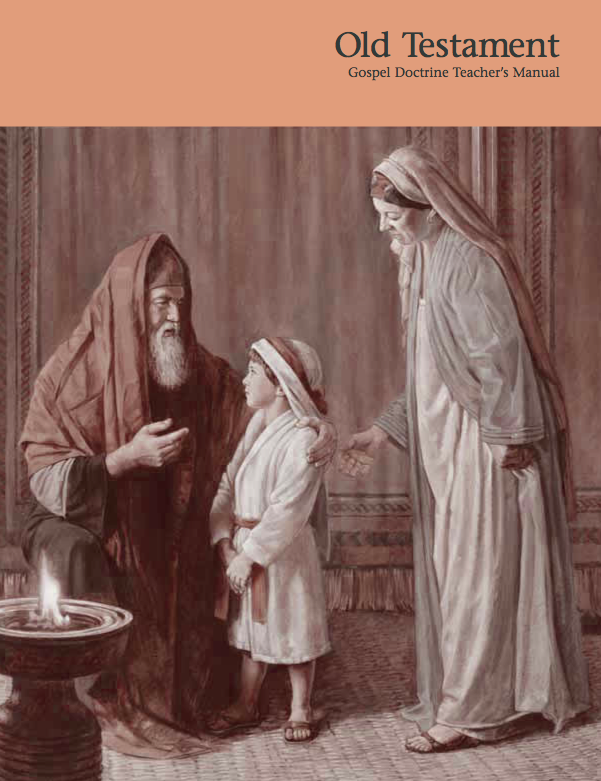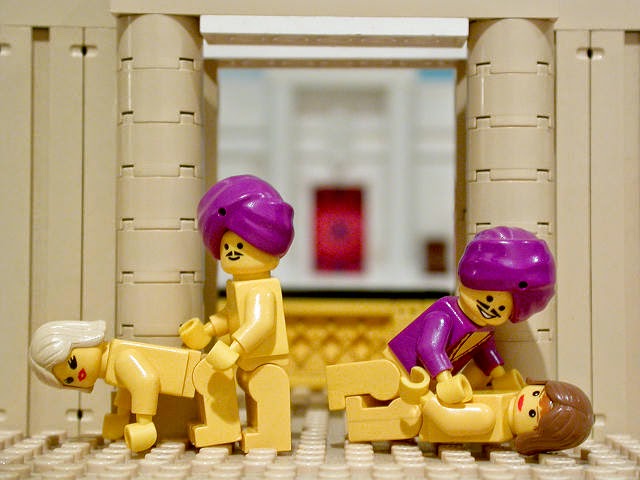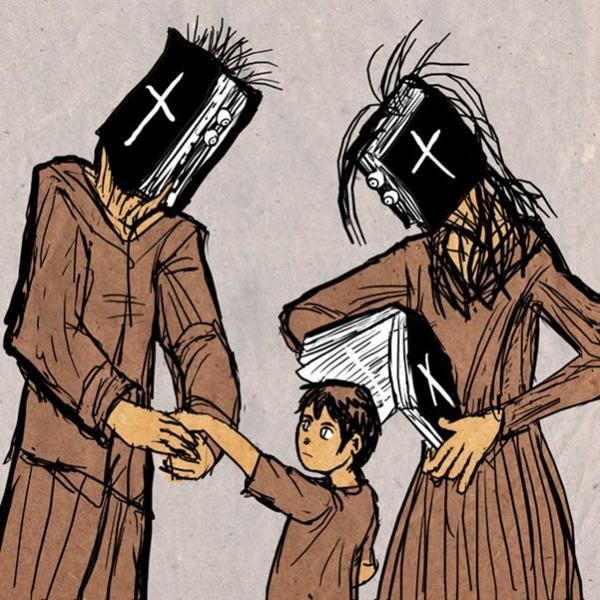God Will Honor Those Who Honor Him
1 Samuel 2–3; 8
LDS manual: here
Reading
This lesson’s about the beginning of the life of Samuel. Israel is going through some upheaval; it’s still fighting its wars of conquest and there are still Philistines to be smote, but now Israel’s trying to join the developing world and move from religious theocracy to something a bit more secular and regal. Jehovah’s gonna be ticked.
There are some things in this lesson you’re not going to believe (because who would?), so let’s get to them.
Ch. 2: Would you give your child to a priest? Samuel’s mom does. Here’s the cover of the real LDS lesson manual, and it sets off some creep alarms for me.
The old dude is Eli, the high priest. He has a couple of sons who abuse their office as priests. When it was sacrifice time, they’d nick off with Jehovah’s tastiest treats.
2:12 Now the sons of Eli were sons of Belial; they knew not the LORD.
2:13 And the priest’s custom with the people was, that, when any man offered sacrifice, the priest’s servant came, while the flesh was in seething, with a fleshhook of three teeth in his hand;
2:14 And he struck it into the pan, or kettle, or caldron, or pot; all that the fleshhook brought up the priest took for himself. So they did in Shiloh unto all the Israelites that came thither.
2:15 Also before they burnt the fat, the priest’s servant came, and said to the man that sacrificed, Give flesh to roast for the priest; for he will not have sodden flesh of thee, but raw.
2:16 And if any man said unto him, Let them not fail to burn the fat presently, and then take as much as thy soul desireth; then he would answer him, Nay; but thou shalt give it me now: and if not, I will take it by force.
And they’d seduce women at the door of the tabernacle.
2:22 Now Eli was very old, and heard all that his sons did unto all Israel; and how they lay with the women that assembled at the door of the tabernacle of the congregation.
Eli, like a good father, tells them to knock it off, but they aren’t having any.
2:23 And he said unto them, Why do ye such things? for I hear of your evil dealings by all this people.
2:24 Nay, my sons; for it is no good report that I hear: ye make the LORD’s people to transgress.
2:25 If one man sin against another, the judge shall judge him: but if a man sin against the LORD, who shall intreat for him? Notwithstanding they hearkened not unto the voice of their father, because the LORD would slay them.
You might remember that parents can have their disobedient children stoned to death, but for some reason Eli doesn’t avail himself of this mechanism. Not killing his sons is what the manual calls ‘honor[ing] his sons above the Lord’.
Then a ‘man of God’ comes and tells Eli that, despite his attempts to correct his sons, everyone in his family will die.
2:31 Behold, the days come, that I will cut off thine arm, and the arm of thy father’s house, that there shall not be an old man in thine house.
2:32 And thou shalt see an enemy in my habitation, in all the wealth which God shall give Israel: and there shall not be an old man in thine house for ever.
2:33 And the man of thine, whom I shall not cut off from mine altar, shall be to consume thine eyes, and to grieve thine heart: and all the increase of thine house shall die in the flower of their age.
Ch. 3: A cute story. Samuel’s an imaginative child who hears voices in his head. He thinks the voices are Eli calling him, so he asks what Eli wants. After the third time, Eli thinks maybe it’s God, and tells Samuel to ask what it wants.
In my Gospel Doctrine teaching days, I used to say that many of us have spiritual gifts, but we sometimes need someone to help us recognise them. Now I’d say that childish fantasies are harmless until some god-addled adult gets a hold of us and funnels our youthful imagination into their cookie-cutter religion.
Anyway, what does the Lord tell the child Samuel? Something truly disturbing.
3:12 In that day I will perform against Eli all things which I have spoken concerning his house: when I begin, I will also make an end.
3:13 For I have told him that I will judge his house for ever for the iniquity which he knoweth; because his sons made themselves vile, and he restrained them not.
In the morning, Samuel tells Eli. The old man seems shattered.
3:18 And Samuel told him every whit, and hid nothing from him. And he said, It is the LORD: let him do what seemeth him good.
Ch. 4: It all comes to pass; Eli’s sons killed in battle. Even worse, the Ark — Jehovah’s favourite furniture — is captured.
4:10 And the Philistines fought, and Israel was smitten, and they fled every man into his tent: and there was a very great slaughter; for there fell of Israel thirty thousand footmen.
4:11 And the ark of God was taken; and the two sons of Eli, Hophni and Phinehas, were slain.
Eli is so surprised by this that he falls and breaks his neck.
4:16 And the man said unto Eli, I am he that came out of the army, and I fled to day out of the army. And he said, What is there done, my son?
4:17 And the messenger answered and said, Israel is fled before the Philistines, and there hath been also a great slaughter among the people, and thy two sons also, Hophni and Phinehas, are dead, and the ark of God is taken.
4:18 And it came to pass, when he made mention of the ark of God, that he fell from off the seat backward by the side of the gate, and his neck brake, and he died: for he was an old man, and heavy. And he had judged Israel forty years.
Hm. He seemed unfazed by the deaths of his sons; it was the news about Ark that finished him off. Forget what I said about Eli being a good father.
Ch. 5: Now the insanity starts. And you know this part’s good because they left it out of the official reading. So sit down on your special donut-shaped pillows, children, and I’ll tell you a story. Even though other people have probably told it better.
The Philistines put the Ark in the temple of Dagon the fish god. Mysteriously, the statue of Dagon falls over.
5:1 And the Philistines took the ark of God, and brought it from Ebenezer unto Ashdod. 5:2 When the Philistines took the ark of God, they brought it into the house of Dagon, and set it by Dagon.
5:3 And when they of Ashdod arose early on the morrow, behold, Dagon was fallen upon his face to the earth before the ark of the LORD. And they took Dagon, and set him in his place again.
Dagon falls again the next morning. And breaks. They don’t make gods like they used to.
5:4 And when they arose early on the morrow morning, behold, Dagon was fallen upon his face to the ground before the ark of the LORD; and the head of Dagon and both the palms of his hands were cut off upon the threshold; only the stump of Dagon was left to him.
5:5 Therefore neither the priests of Dagon, nor any that come into Dagon’s house, tread on the threshold of Dagon in Ashdod unto this day.
Think someone could get me one of these for my car?
Dagon: the original fish god.
But God’s not done yet. Whoever has the Ark, he smites with emerods. What’s an emerod? It’s a haemorrhoid.
5:6 But the hand of the LORD was heavy upon them of Ashdod, and he destroyed them, and smote them with emerods, even Ashdod and the coasts thereof.
That’s right: whenever they move the Ark to a new city, everyone in that city gets haemorrhoids. In their secret parts.
5:9 And it was so, that, after they had carried it about, the hand of the LORD was against the city with a very great destruction: and he smote the men of the city, both small and great, and they had emerods in their secret parts.
Haemorrhoids are painful, certainly, but I’m trying to imagine haemorrhoids so bad that you could die from them. All I can imagine is everyone in the Philistine cities running around with blood pouring out of their asses, screaming. It must be true; it’s in the Bible.
So what to do with the Ark? Send it back!
5:11 So they sent and gathered together all the lords of the Philistines, and said, Send away the ark of the God of Israel, and let it go again to his own place, that it slay us not, and our people: for there was a deadly destruction throughout all the city; the hand of God was very heavy there.
5:12 And the men that died not were smitten with the emerods: and the cry of the city went up to heaven.
Ch. 6: But when you’re sending back an ass-sundering poison Ark, you can’t just return it like nothing ever happened. You can’t just show up with blood all over the seat of your pants and say, “Uh… here — I found this.” No, in this situation, etiquette dictates that you make an “I’m very sorry I took your Ark” offering. And in this case, the Philistines have a very appropriate gift in mind.
6:4 Then said they, What shall be the trespass offering which we shall return to him? They answered, Five golden emerods, and five golden mice, according to the number of the lords of the Philistines: for one plague was on you all, and on your lords.
Yes, they made golden versions of their inflamed rectal polyps. And golden mice, which makes some people think that the emerods were actually the bubonic plague, which was spread by rats. But do you get bubonic plague in your ‘secret parts’ specifically? I’m not an expert, but I’m sticking with haemorrhoids.
You know how most of the sentences we say are one-offs that no one’s ever said before and no one will ever say again? I’m realising that “I’m sticking with haemorrhoids” is probably one of those. I’ve never typed it before, and I never plan to again.
When the Ark arrives, it’s still not great news because some of the Israelites take a sneaky peek into the Ark. I’m guessing they wanted to look at the golden haemorrhoids. I’d be curious to see what one looked like, wouldn’t you? I’d be checkin’ out those haemorrhoids.
Because they peeked, God killed 50,070 men.
6:19 And he smote the men of Bethshemesh, because they had looked into the ark of the LORD, even he smote of the people fifty thousand and threescore and ten men: and the people lamented, because the LORD had smitten many of the people with a great slaughter.
THEM’S MAH POLYPS, MOFO. You don’t just open the Ark to look at Jehovah’s polyps! What were they thinking?
So it seems that the Ark was just as bad for the Israelites as it was for the Philistines, even if the Bible writer blamed it on curiosity.
Since you’re probably curious too, here’s a picture of what a golden haemorrhoid probably looked like. Now your curiosity can be assuaged — ah, le mot juste — and you don’t have to die.
Ch. 7: After years of bumping around with judges, Samuel comes to take control. But he’s a strict Jahwist. He’s what we’d call a hardliner.
7:2 And it came to pass, while the ark abode in Kirjathjearim, that the time was long; for it was twenty years: and all the house of Israel lamented after the LORD.
7:3 And Samuel spake unto all the house of Israel, saying, If ye do return unto the LORD with all your hearts, then put away the strange gods and Ashtaroth from among you, and prepare your hearts unto the LORD, and serve him only: and he will deliver you out of the hand of the Philistines.
Samuel firmly takes the reins, and offers a sacrifice. Finally, Israel has a priest-leader again.
7:7 And when the Philistines heard that the children of Israel were gathered together to Mizpeh, the lords of the Philistines went up against Israel. And when the children of Israel heard it, they were afraid of the Philistines.
7:8 And the children of Israel said to Samuel, Cease not to cry unto the LORD our God for us, that he will save us out of the hand of the Philistines.
7:9 And Samuel took a sucking lamb, and offered it for a burnt offering wholly unto the LORD: and Samuel cried unto the LORD for Israel; and the LORD heard him.
Ch. 8: Israel, up to this point, has been trying to free itself from the shackles of religious ledership. They’ve flirted with integration and multiculturalism, and now they want a secular king.
8:4 Then all the elders of Israel gathered themselves together, and came to Samuel unto Ramah,
8:5 And said unto him, Behold, thou art old, and thy sons walk not in thy ways: now make us a king to judge us like all the nations.
8:6 But the thing displeased Samuel, when they said, Give us a king to judge us.
Jehovah/Jesus isn’t too happy about it either.
8:6 And Samuel prayed unto the LORD.
8:7 And the LORD said unto Samuel, Hearken unto the voice of the people in all that they say unto thee: for they have not rejected thee, but they have rejected me, that I should not reign over them.
Can you guess why a priest would hate the notion of a secular king? Right — because there goes his gig. So every time the people want this sort of thing, the prophet or priest gets very grumpy and threatens them with punishment from god, and blames them when they lose their battles of empire. And very often the people believe him and sink back into the morass of theocracy. (Not that monarchy is great or anything, but secular leadership is a least a step in the right direction.)
Well, this time, the people refuse to capitulate, and persist in demanding a king. So Samuel rather sourly tells them what to expect.
8:11 And he said, This will be the manner of the king that shall reign over you: He will take your sons, and appoint them for himself, for his chariots, and to be his horsemen; and some shall run before his chariots.
8:12 And he will appoint him captains over thousands, and captains over fifties; and will set them to ear his ground, and to reap his harvest, and to make his instruments of war, and instruments of his chariots.
8:13 And he will take your daughters to be confectionaries, and to be cooks, and to be bakers.
8:14 And he will take your fields, and your vineyards, and your oliveyards, even the best of them, and give them to his servants.
8:15 And he will take the tenth of your seed, and of your vineyards, and give to his officers, and to his servants.
8:16 And he will take your menservants, and your maidservants, and your goodliest young men, and your asses, and put them to his work.
8:17 He will take the tenth of your sheep: and ye shall be his servants.
Wow, the king is going to take a tenth of their stuff? That’s a weird criticism from a priest. “Hey, you guys! If you have a king, you’ll have to pay him a tenth! You don’t want that; that’s really terrible! And by the way, some of you are falling behind on your tithing.”
8:18 And ye shall cry out in that day because of your king which ye shall have chosen you; and the LORD will not hear you in that day.
Jehovah can be so pissy sometimes.
The king v priest conflict is going to come to a head in the next lesson, so we’ll leave it there for now.
Main points from this lesson
God punishes Eli’s family for his sons’ sins
In this story, Eli’s entire family was killed for the actions of Eli’s adult sons, even though Eli took them to task, and was unsuccessful in bringing them around.
I want to take this opportunity to address what I think is a very damaging aspect of Mormon parenting: the idea that God will hold parents responsible for their children’s behaviour.
Okay, yes, if children are little ratbags, then sometimes we can trace it back to inexpert or neglectful parenting. But I’m talking about something a bit different: a parent’s tendency to
control their children’s activity in the church, and
blame themselves if their children ‘go astray’; that is, grow up and leave the LDS Church.
In one particularly rank example of my experience, the father — a bishop — attempted to choose his children’s habits, friends, activities, and information inputs, in the belief that his god would hold him responsible for things they did before adulthood.
I think having a successful family requires something called differentiation, and that’s the idea that we’re different people, we may have different views, but we work together as a family, and we deal with our differences respectfully. In this model, couples try to have a bit of breathing space, not depending on each other for their good feelings. Parents can allow their children to have different views and grow into their adult status, without feeling threatened.
Compare that to the view promoted by the lesson manual, which asks:
In what ways do we sometimes honor other people more than God?
We fail to correct family members or friends in their wrongdoing because we want to maintain good relations with them.
Correct family members or friends in their wrongdoing? Hey, there’s nothing wrong with a little friendly advice, but is it our job to ‘correct’ our friends? I don’t think this is a case of unfortunate wording; this is the view held by people who truly think they know better.
Differentiation is near impossible in a family where
- only one set of values is considered true or moral
- those with divergent views or values are marginalised
- there’s a strict hierarchy of control, and
- respect toward the ones in power is expected because of their position in the hierarchy, and not because of their human qualities.
The model promoted by the Eli story (and the murder of Achen’s family), practiced by many Mormons, is one in which it’s very difficult to be a differentiated person because you’ll suffer the consequences of other people’s choices. And spouses or children who deconvert or question can’t have their views respected because they may cause damage to the family unit or the family members themselves (in Eli’s case, bodily).
And there’s something else that this lesson beings into the mix: the idea that Jehovah/Jesus always comes first. The stated purpose of this lesson is:
To help class members understand the blessings of honoring and pleasing the Lord above themselves, others, or the world.
So you have to prioritise Jehovah/Jesus — or should I say his earthly representatives — before your family, before other people, and even before yourself. It’s why I say that the LDS Church doesn’t try to support the family; it attempts to supplant the family.
My parents were wonderful people who did a great job in parenting, despite some really terrible assumptions. But when I look back on my own childhood, what strikes me is how much unnecessary suffering my parents went through with me over ordinary issues like dating, card playing, music, friends, and clothing. They really agonised over this stuff, when really I was doing fine.
Now that I’ve realised that there’s more than one way to live, it’s made my job as a parent a lot easier. There are still things I caution my children to avoid, but I no longer buy into the idea that my children will suffer eternal isolation for failing to obey the arbitrary commandments of a murderous bronze-age deity. They’re responsible for their own actions, and my job is to help them understand the consequences of those actions, and get practice in the little choices, so they’ll be good at the big ones.
Additional ideas for teaching
God’s responsible for the bad stuff, too.
Modern believers tend to give their god all the credit for the good things that happen to them, but if something bad happens, that’s something else. Satan, possibly, or themselves.
Ancient Israelites didn’t feel that way. Remember, they hadn’t invented Satan yet, so everything that happened, they put it all down to God.
So when Samuel’s mom gets pregnant with Samuel, she sings about it:
2:6 The LORD killeth, and maketh alive: he bringeth down to the grave, and bringeth up.
Isn’t that a more honest view? After all, if you’re going to give the credit to the guy who set this whole thing up, you’ve got to blame him for the bad bits.
What if theists had this view today? Hymns might be different, for one thing.
Of course, Samuel’s mom gets no bonus points for noticing that God kills people; he’s only been doing it for the entire book up to this point.
Does the earth rest on pillars?
Samuel’s mom continues.
2:8 He raiseth up the poor out of the dust, and lifteth up the beggar from the dunghill, to set them among princes, and to make them inherit the throne of glory: for the pillars of the earth are the LORD’s, and he hath set the world upon them.
Believers sometimes claim that the Bible (or the Qur’an) contains accurate information about the earth that predates its scientific discovery. While it is possible to cherry-pick isolated scriptures and find a match for this or that fact, this strategy counts the hits and ignores the misses. This verse about the earth’s pillars is dismissed as ‘metaphorical’ or ‘poetic’, but other nearby verses are accepted as factual predictions because they happen to match observable reality.
Anyway, everyone knows it’s really turtles all the way down. Let’s have a closing hymn.







1 June 2014 at 8:29 pm
I lost track of how many types of brilliance you exhibit here.
Seriously good stuff.
2 June 2014 at 2:31 pm
Amen-Ra, you deserve an award for this stuff.